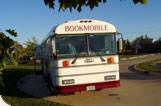 The Champaign Public Library announced a few days ago that its bookmobile is being retired. For those of us who grew up with bookmobiles, it’s like hearing that the last Big Boy has finally closed, or that station wagons will no longer have fake wood paneling, or that fake wood paneling itself will no longer be manufactured.
The Champaign Public Library announced a few days ago that its bookmobile is being retired. For those of us who grew up with bookmobiles, it’s like hearing that the last Big Boy has finally closed, or that station wagons will no longer have fake wood paneling, or that fake wood paneling itself will no longer be manufactured.
None of these items are necessary anymore, but they do have a certain kitschy charm that is missing in architecturally-sound and efficiently laid-out public library spaces. Of course, I say this as I sit here typing in our beautiful new Champaign public library building, with a view of the old Solon House to keep me company on the other side of the window. Herein lies the problem: I wouldn’t trade this view for a hundred kitschy bookmobiles.
In fact, the only time I stepped foot in the Champaign bookmobile was when it was used as the temporary library while the new one was being finished. But doing so immediately brought back a rush of memories from the early 1970s in Ft Wayne, Ind., where my family made heavy use of our local bookmobile.
Before branch libraries proliferated and two cars (or more) per family became the norm, fleets of bookmobiles were employed by public libraries across the country to bring books to the masses. My neighborhood was an ideal candidate, as it was a rural outpost, miles away from grocery stores, much less libraries. School libraries were often hit or miss back then, and bookmobiles provided a vital service to households with moms (they were always moms) desperately searching for outlets for their kids.
The selection wasn’t great on any particular week, but what made bookmobiles useful were the librarians. In fact, librarians get a bad rap as shy, strict spinsters. I’ve never met a librarian who was not passionate about his or her work. They see themselves not as mere babysitters of books, but as gatekeepers, responsible for nothing short of the transmission of knowledge to the human race. It’s hard to slough off in your job when you see it as necessary for the continuance of civilization. (And it explains why my librarian brother dutifully continues to send links to snopes.com to my mom, who sends out her weekly warnings that some household object is about to kill us all).
After a few trips to my childhood bookmobile, the librarian there had managed to wheedle out of us what kind of books we liked. After that, the bookmobile would be suspiciously stocked with choices that seemed tailored to our interests. I was partial to Encyclopedia Brown and The Three Investigators, plus sports hero biographies (Roberto Clemente, Jim Brown), and I never failed to find such appropriate offerings each time I went. As I worked my way through a book series, subsequent installments would magically appear over time.
 Bookmobiles back then were necessary little access points to books and knowledge in general. Now they must compete with so many other, more convenient choices. Remember when the only bookstores were B. Dalton at the mall? Now we have superstores like Borders or Barnes & Noble in every shopping center, plus the infinite supply of Amazon and the whole of the internet to choose from. Transportation is not the same barrier it once was and libraries continue to expand both their collections and locations. The Champaign Library reports that bookmobiles were at their peak in 1965, and less than half are still in operation. And it will be less than half minus one as of this summer.
Bookmobiles back then were necessary little access points to books and knowledge in general. Now they must compete with so many other, more convenient choices. Remember when the only bookstores were B. Dalton at the mall? Now we have superstores like Borders or Barnes & Noble in every shopping center, plus the infinite supply of Amazon and the whole of the internet to choose from. Transportation is not the same barrier it once was and libraries continue to expand both their collections and locations. The Champaign Library reports that bookmobiles were at their peak in 1965, and less than half are still in operation. And it will be less than half minus one as of this summer.
This decision for the Champaign Library makes sense. It would cost $200,000 to buy a new bookmobile, and it already costs $150,000 per year to maintain and operate one. As a taxpayer and a heavy-use library patron, I would rather that money be spent on the collection itself. It doesn’t make sense to spend so much taxpayer money on nostalgia.
So, bookmobiles may have outlived their day, but luckily, librarians have not, and remain as committed as ever. My kids didn’t grow up with bookmobiles, but they have spent plenty of time at the children’s desk at the library, asking what they should read next, and getting answers from folks who know that the future of civilization may just depend on their sage advice.








